|
ONLINE: HONORS Literature
Novels by Women
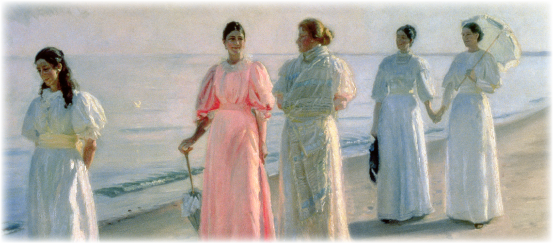
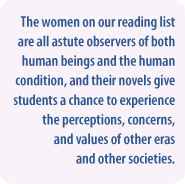 Students in this course will read great works from around 1800 to the early 20th century—all by women. Along the way, they learn a good deal about human nature, relationships, deceit, and self-deception. Students in this course will read great works from around 1800 to the early 20th century—all by women. Along the way, they learn a good deal about human nature, relationships, deceit, and self-deception.
What students learn
One of the best reasons for reading great novels is that they afford rare opportunities to eavesdrop on characters' thoughts and feelings as they are being experienced. And when you begin to identify with a character, you discover what it feels like to be someone else. A fine teacher of literature at Northwestern University recently wrote that when reading novels—
… readers watch heroes and heroines in the never-ending process of justifying themselves, deceiving themselves, arguing with themselves. That is something you cannot watch in real life, where we see others only from the outside and have to infer inner states from their behavior... [Reading an account of] a quarrel, we experience from within what each person is perceiving and thinking. How misunderstandings or unintentional insults happen becomes clear. — This is a form of novelistic wisdom taught by nothing else quite so well.
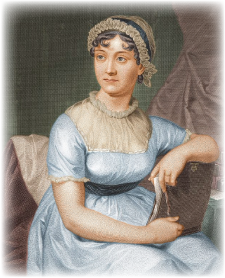 The women on our reading list are all astute observers of both human beings and the human condition, and their novels give students a chance to experience the perceptions, concerns, and values of other eras and other societies. To understand these novels, students must suspend their own 21st-century values and ways of looking at things and, for a while, entertain perspectives quite different from their own. Such reading becomes an exercise in understanding historical and cultural context, expanding one's imagination, and developing one's capacity for insight and empathy. The women on our reading list are all astute observers of both human beings and the human condition, and their novels give students a chance to experience the perceptions, concerns, and values of other eras and other societies. To understand these novels, students must suspend their own 21st-century values and ways of looking at things and, for a while, entertain perspectives quite different from their own. Such reading becomes an exercise in understanding historical and cultural context, expanding one's imagination, and developing one's capacity for insight and empathy.
Assignments
The primary activities in this course are 1) reading the novels on our reading list (see below) and 2) class discussion of those readings. In the process, students will be trained in:
- Close reading & annotation. In class, students will consult their annotations to discuss their reading, and from time to time, they will scan their annotated pages from their books and submit them to the instructor for coaching and discussion.
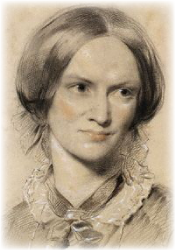 Thinking/analysis/mindmapping. Students will be introduced to thinking tools as aids to analytical thinking. Thinking/analysis/mindmapping. Students will be introduced to thinking tools as aids to analytical thinking.- Vocabulary. Students will list new words they've encountered in their reading and master the definitions and correct usage of those words.
- Writing. Students will write two analytical essays, one per semester; they will be coached on writing effective literary analysis and will learn the essentials of MLA format. One of the most valuable activities: Students in this course read and comment on one another's essays.
Reading list
Students will likely read around seventy pages per week (at least thirty-some-odd pages from one class to the next). All works will be introduced with a historical perspective, and they will be read in a sequence roughly corresponding to the difficulty and complexity of the prose style.
Please note: The following list may be subject to change.
Prerequisite
Students must be reading at an 9th-grade reading level or better.
Need to assess your your student's reading level? — Use this link.
IMPORTANT: Note on purchasing texts
All links above are to the editions we will be using in this course — all physical texts, please; no Kindle editions.
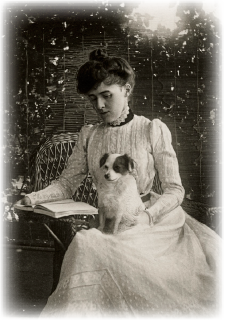 Students should purchase these specific editions in copies that are either new or in good condition and — most important — free of internal highlighting or underlining. The reason: Students in this course will be instructed in close reading and annotation; they will at times be required to scan pages from their texts and email them to the instructor for his review. It's vital that all annotations reviewed by the instructor be the student's own work (not those of a text's previous owner). Students should purchase these specific editions in copies that are either new or in good condition and — most important — free of internal highlighting or underlining. The reason: Students in this course will be instructed in close reading and annotation; they will at times be required to scan pages from their texts and email them to the instructor for his review. It's vital that all annotations reviewed by the instructor be the student's own work (not those of a text's previous owner).
Course fees
The fee for this two-semester course is $1190., with half that amount ($595) due upon registration.
What's included
This year-long course comprises:
- 75 hours of instruction: 30 ninety-minute sessions and 30 one-hour sessions;
- instructor materials in the form of printable PDFs;
- instructor feedback on student essays.
Course fee does not include: The texts we'll be reading (see "Note on purchasing texts" above).
|
|
|
Returning in 2024–25
All sessions live & interactive
Students attend
two classes per week
To contact the instructor, click here.
Fee for entire year: $ 1190.
Please note: At registration, you will pay
the fee for the fall semester ($ 595.); for the
winter-spring semester we will invoice you,
with payment due by September 1, 2022.
Featured Novel
"Sofia Petrovna" (1940)
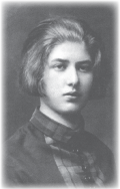 Lydia Chukovskaya's Sofia Petrovna has unusual origins: unlike most novels, it was conceived as testimony—a statement of evidence on life in Stalin's Russia. Lydia Chukovskaya's Sofia Petrovna has unusual origins: unlike most novels, it was conceived as testimony—a statement of evidence on life in Stalin's Russia.
It took great courage to write such a novel in that time and that place. Written in a thick school notebook and hidden by Chukovskaya's friends for decades, the novel documents the effects of the period now known as the Great Purge. From 1936 to 1938, the secret police in Soviet Russia carried out mass surveillance and arrests, resulting in the murder of approximately a million people for "crimes against the state."
In the novel, the events of 1937 are viewed through the eyes of one mother: her son has been arrested, and according to the prosecutor, the young man has admitted his crimes and deserves his sentence—ten years of hard labor with no visitation or correspondence. The mother, Sofia Petrovna, has been schooled to trust Soviet newspapers and officials—and trust them even more than her own maternal instincts. Yet she knows her son to be loyal to the party, to his factory, and to Comrade Stalin personally. Her story is written in a simple, direct style that is all the more wrenching for its simplicity, and the novel traces her slow awakening to the harsh realities of the era she's trying to survive.
The real-life husband of the novel's author, Lydia Chukovskaya (shown above right), had been arrested on a false charge, tried in secret, and—unbeknownst to her—executed in 1937. In 1974, Chukovskaya herself was expelled from the Soviet Writers' Union for supporting Soviet dissidents, resulting in her loss of any right to publish inside the Soviet Union. Her novel was not published in the Soviet Union until 1988, almost fifty years after its completion.
She died in 1996.
|
|
![]()